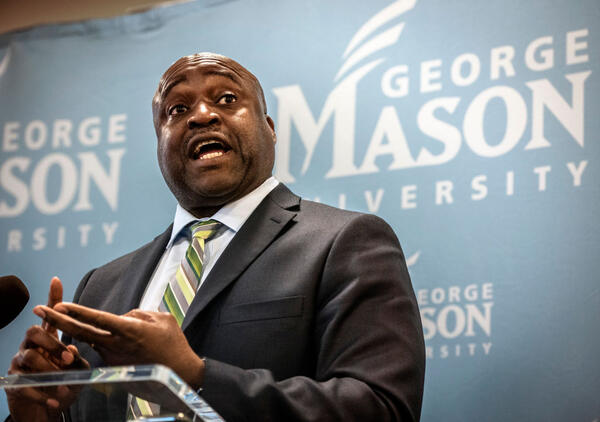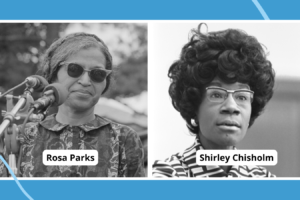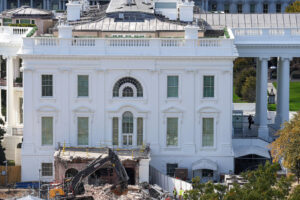
George Mason Must Not Comply With the Government’s Demands (opinion)
The Department of Education is demanding a personal apology from George Mason president Gregory Washington.
Bill O’Leary/The Washington Post via Getty Images
On Aug. 22, the U.S. Department of Education’s Office for Civil Rights announced that George Mason University, led by President Gregory Washington, violated Title VI of the Civil Rights Act of 1964. The agency demanded an extraordinary remedy—President Washington must issue a personal apology, to be posted “prominently on the University website,” retract statements supporting diversity and abandon practices that even hint at equity-focused hiring. The message to George Mason, where I was a professor of public policy for nearly two decades, is clear: Equity is now presented as a civil rights violation.
Title VI was meant to prevent discrimination, not to penalize institutions for recognizing that diversity matters. With courts allowing the consideration of diversity as one factor among many in holistic decisions, OCR’s stance appears to be a politically motivated shift away from long-standing interpretations—not a clear enforcement of the law. Just last week, a federal judge “struck down two Trump administration actions aimed at eliminating diversity, equity and inclusion programs at the nation’s schools and universities,” the Associated Press reported.
Most alarming in OCR’s proposed resolutions is the demand for a personal apology from the university’s first Black president. Washington, who called for eliminating racist legacies on campus, is now being compelled to apologize for doing just that. This isn’t simply an institutional issue—it’s a deeply symbolic act that resembles public shaming of a leader of color for advocating inclusion. It evokes the disturbing history of targeting minority leaders through law and policy.
This move against Mason is not an isolated incident; it is part of a broader effort to reshape public institutions. Consider the Trump administration’s recent attacks on the Smithsonian Institution. The president criticized the Smithsonian for highlighting slavery’s brutality and diversity in its exhibits, calling the museums “out of control” and “too woke.” He ordered a comprehensive review of Smithsonian content to align it with his vision of “American exceptionalism,” demanding changes to exhibits begin within 120 days.
Here again, ideology replaces impartial curation. A common thread emerges: Whether in higher education or national museums, diversity and sincere historical reflection are viewed not as civic strengths but as transgressions. Institutional autonomy and academic governance are being subordinated to partisan narratives.
Should we dismiss the department’s findings as another part of the culture wars? I worry the consequences are much more serious. If OCR’s interpretation of Title VI holds, even referring to diversity as a priority could trigger federal enforcement. Schools are feel compelled to eliminate inclusive programs, silence voices advocating for equity and adhere to a limited historical perspective—all out of fear of losing funding.
That chilling effect would cripple higher education when it needs vibrancy most. Universities must remain havens of reasoned inquiry, honest history and inclusive excellence. When federal agencies start dictating not only policy but the exact language leaders must use, we enter coercive territory.
GMU’s faculty, students, alums and board members must unite in opposition to OCR’s unjustified demands. The proposed resolution is not genuine compliance; it’s forced capitulation driven by intimidation. Institutions should not be compelled to apologize for standing up for the principles of true equal opportunity.
This moment is a clarion call for universities. Yesterday, it was the University of Pennsylvania and Harvard, dragged through headline-grabbing investigations. It was New College of Florida, where political appointees dismantled DEI programs and faculty governance. It was the University of Virginia, accused by the Department of Justice of defying federal antidiscrimination laws. Today it is Mason. Tomorrow, it could be UCLA, Michigan, Wisconsin or any other institution that values diversity, equity and academic freedom. No campus—public or private, flagship or regional—should assume it is immune.
George Mason should reject the department’s findings and oppose this injustice. Capitulation is not compliance; it’s surrender. If Mason yields, it will damage its credibility and encourage more attacks on higher education nationwide. When universities submit to politically motivated demands disguised as enforcement, they legitimize them and invite more. Silence will be perceived as complicity. Resistance is crucial to protecting the fundamental principles of higher education: autonomy, fairness and the freedom to teach and learn without political interference.
This is not the first time universities have faced pressure to abandon their commitments to equity and truth. In the 1960s, Southern universities used “law and order” to oppose desegregation. In the 1980s and 1990s, Black faculty and administrators pushing for fair representation often faced vilification and political retaliation. Today, the same tactics are being used, only now they are masked in the language of “civil rights enforcement.”
What is happening at Mason is part of that history. Title VI, a law born of the civil rights movement to expand opportunity, is being distorted into a tool to silence leaders of color and dismantle diversity initiatives. President Washington’s commitment to pursuing equity should be celebrated, not criminalized. Twisting Title VI into an instrument of ideological punishment and racial scapegoating should alarm everyone who values a democracy that depends on honest history, inclusive leadership and academic freedom.
And let’s be honest: Coercing a university president to issue a scripted public apology isn’t enforcement—it’s extortion. It’s the same tactic organized crime always uses: Demand submission, humiliate and make an example of one victim to scare others. That has no place in a democracy, much less in higher education.
The struggle now is the same as it was then: whether our universities will stay places of truth, inclusion and independent thought, or whether they will become tools of partisan control. Mason must choose the first. And the rest of us—in Virginia and across the country—must support it.
Source link



